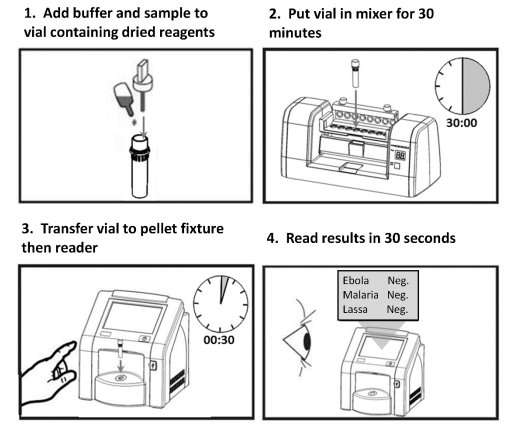December 13, 2018 report
Faster test for Ebola shows promising results in field trials

A team of researchers with members from the U.S., Senegal and Guinea, in cooperation with Becton, Dickinson and Company (BD), has developed a faster test for the Ebola virus than those currently in use. In their paper published in Science Translational Medicine, the group describes how the device works, and its results when tested on animals and humans in field tests.
Ebola is a disease caused by the Ebola virus—it is rare but deadly. When an outbreak occurs, a quick response is required, because it spreads rapidly. In the worst outbreak to date, over 11,000 people died in West Africa in 2014. The current testing regimen hampers efforts to control outbreaks—blood is drawn from patients with Ebola-like symptoms, which resemble symptoms in initial stage infections of other diseases such as malaria. The samples must then be sent to a lab for testing. The whole process takes several days, which means the infected person continues to transmit the disease. In this new effort, the researchers have developed a new test device that allows for on-site testing in less than 30 minutes.
The device uses surface-enhanced Raman scattering and builds on technology already under development by BD. The team modified an existing device to detect viruses in a blood sample. It bounces light off the molecules in a blood sample and the results are compared with embedded barcodes representing disease signatures. All that is required is a small blood sample. After testing, the device provides a readout that can be understood by virtually anyone who can read.
The researchers tested the device in monkey models and achieved the results they were hoping for. They next conducted field trials in both Guinea and Senegal and found the device showed strong sensitivity for Ebola and excellent sensitivity for malaria. They plan to continue their research to improve the results, but suggest the device could soon be used to diagnose both diseases in places where there is no electricity and time is of the essence.
More information: David Sebba et al. A point-of-care diagnostic for differentiating Ebola from endemic febrile diseases, Science Translational Medicine (2018). DOI: 10.1126/scitranslmed.aat0944
© 2018 Science X Network
















